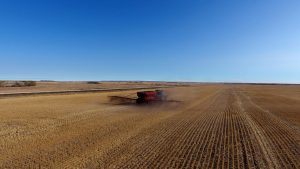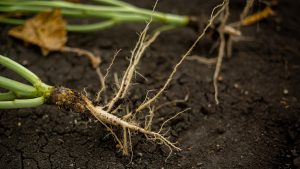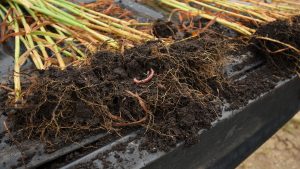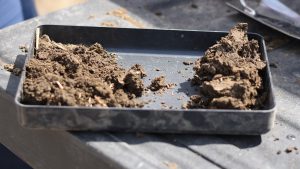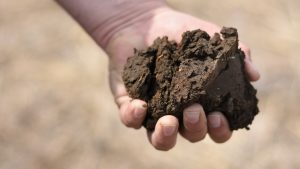It is more important than ever to increase crop production with the land you have, rather than trying to buy more acres. This means it is vital to ensure that any non-producing acres are brought back into production and any under-performing acres are improved to maximize their output. Any land that you own that is not producing at its maximum output, is leaving money on the table.
What factors contribute to under-performing land?
1. Carbon and organic matter deficiency
2. Salinity and/or alkali conditions
3. Drought
4. Compaction and hardpan
1. Carbon & Organic Matter Deficiency
Carbon is the fundamental building block of compounds that plants use for nutrition such as fats, carbohydrates, and proteins.
Organic matter provides an environment for microorganisms to exist which then leads to the creation of plant nutrition.
As farming practices have advanced and improved over the last century, greater amounts of carbon and organic matter are being used.
Natural carbon sequestration from the atmosphere and natural development of organic matter in soils can no longer keep up with the high demands being placed on farmland and as a result, a deficiency occurs, and the plant cannot acquire proper nutrition from the soil.
How does humalite address carbon and organic matter deficiency?
Humalite is very high in carbon and organic matter.
While many humic products on the market today also contain carbon and organic matter, they are targeted towards single season use and not for soil amendment.
Our humalite product is intended to be broadcasted at a high rate to replenish carbon and organic matter levels in soil for years to come without having to apply indefinitely.
2. Salinity and/or Alkali Conditions
Salinity and alkali conditions can be detrimental to farmland and can prevent crop production entirely.
When excessive amounts of salt is found in the soil it can prevent the plant from taking up water which leads to wilted foliage, stunted growth, and eventually plant mortality.
Salinity and alkali conditions also allow for a concentration of toxic ions that are harmful to the plant if present in excess.
How does humalite reduce salinity and alkali?
Salinity occurs because of ionic charges of the salt molecules attaching themselves to the oppositely charged soil and nutrient matter that surround it.
Humalite is able to tie up these ionic bonds so that the salts are not attached to the soil. By breaking the salt’s bonds with the soil, it is able to be carried away by water over time eventually alleviating the salinity.
3. Drought
Many plant processes are halted in the absence of water. The stomata of the plant close in order to avoid moisture loss, causing the metabolism of the plant to be stopped.
When the plant’s metabolism is stopped:
- Oxidative damage occurs
- Growth and development is halted
- The plant’s internal temperature increases to an unhealthy level
In the absence of adequate moisture, soil temperature is also increased leading to decreased microbial activity.
In a drought scenario, nutrients cannot be transported and absorbed by root systems through water.
How does humalite capture and store moisture?
Humalite attracts and holds water extremely well. It has a water holding capacity of 7x its molecular weight.
Not only does it capture and hold onto moisture from precipitation events, but it also draws in atmospheric moisture.
In an environment that is experiencing a drought, the moisture that humalite is able to draw in and hold can make a significant impact on a crop’s growth.
4. Compaction and Hardpan
Compaction and hardpan occur because there is no space between soil particles and oxidation cannot occur.
Compaction and hardpan inhibit the movement of water and nutrients as the soils is too dense, causing unhealthy mineral deposits to stay in the soil profile instead of draining through.
Compacted soil can be difficult to manage as it will become hard and clumpy.
How does humalite eliminate hardpan?
Because of its water holding capacity, the increased moisture will help to soften soils that are compacted.
It creates a more hospitable environment for microorganisms to interact with the soil.
Microorganisms help to create oxidation in soil which creates space between the soil particles, thus softening the compacted areas.
Be Proactive, Not Reactive
It is vital to view your soil as an asset that is constantly evolving. It is much easier to invest in a product like humalite that can prevent issues and maintain or replenish soil health rather than searching for a solution to problems once they already exist. By investing in your soil now, you can ensure that your land will be healthy and productive well into the future.
Contact your TopKrop Rep today see how humic can benefit your farming operation.
